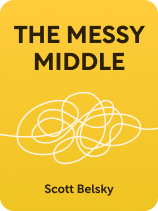

This article is an excerpt from the Shortform book guide to "The Messy Middle" by Scott Belsky. Shortform has the world's best summaries and analyses of books you should be reading.
Like this article? Sign up for a free trial here.
What role does emotional intelligence play in running a successful business? How can your unique perspective become your greatest entrepreneurial asset?
Self-awareness in entrepreneurship shapes how effectively you navigate challenges, handle feedback, and make decisions. Understanding your emotional responses and staying grounded during both triumphs and setbacks can mean the difference between success and failure in business ventures.
Keep reading to discover practical ways to harness your self-awareness and turn it into a competitive advantage in your entrepreneurial journey.
Self-Awareness in Entrepreneurship
To stay objective about your business’s progress, you need to also be realistic about yourself. Scott Belsky emphasizes the critical importance of self-awareness in entrepreneurship as you deal with the challenges of bringing your ideas to fruition. Knowing who you are and how you react to stress can keep you on an even keel through ups and downs, leave you open to other people’s ideas, and turn your uniqueness into a competitive edge.
Belsky writes that understanding your emotional responses and values lets you maintain perspective during both the good times and the bad. During periods of success, some people develop an overblown sense of their abilities and become less receptive to other people’s advice. You may also ignore warning signs that you don’t want to acknowledge. This overconfidence can lead to poor decisions and even a disconnect from reality. Conversely, during hard times, you might become defensive and blame others for your problems. If you’re able to recognize—and hopefully curb—these behaviors in yourself, you’re more likely to maintain a good sense of judgment and take appropriate actions when you need to.
(Shortform note: While Belsky describes the pitfalls of not understanding your emotions, the authors of The 15 Commitments of Conscious Leadership go into detail about how to manage them. First, they write that emotions are simply physical sensations that aren’t inherently good or bad, and neither do they define you. The authors explain that all your emotional responses arise from a handful of primal feelings such as happiness, anger, and fear. They argue that you can release your emotions by taking actions that appropriately express them, and that at the same time you should interpret your emotions to figure out what they’re trying to tell you. Beyond making you a more effective leader, this process can also help you live a balanced life.)
The Benefits of Self-Awareness
Your emotional awareness isn’t just good for you—it’s also good for your business. For instance, being able to moderate your reactions during your venture’s ups and downs can help you stay open to feedback and criticism, which you need as a leader to make informed decisions and avoid critical mistakes. Belsky notes that the most successful entrepreneurs are those who can absorb input from others without becoming overly defensive. Plus, if you can notice your own defensiveness, you’ll also learn to spot when people on your team are having a similar reaction. That will help you guide them through the good and bad times by knowing how much emotionality is guiding the decisions they’re making for your project.
(Shortform note: Belsky presents the problem of handling criticism without becoming defensive, as a matter of emotional control, but in Principles: Life and Work, Ray Dalio tackles the subject from the perspective of truth-seeking as a top priority. He writes that when you’re struggling, the first trap you fall into is that of wishing reality was different than it is. Instead, you should embrace reality while accepting the possibility that your perspective is wrong. This requires you to set aside your ego and acknowledge any blind spots you may have. Dalio’s solution to accomplish both of these, one that also aligns with Belsky’s advice, is to be totally receptive to other people’s input and recognize that good ideas can come from anywhere, not just from you.)
Another benefit of knowing yourself is that you can leverage your uniqueness to stand out from your competitors. Belsky encourages embracing your one-of-a-kind perspective as a source of potential innovations and breakthroughs. It may be tempting to establish your business in terms of what’s been done before, but conformity stifles new ideas. Belsky argues that you should lean into your distinctive vision instead of imitating your competitors. For instance, you might give your product a design that’s eye-catching to some while off-putting to others. Your ideas may strike some people as quirky, weird, or too far from the norm, but unique ideas will attract those who resonate strongly with your vision.
(Shortform note: The unique or strange ideas that Belsky describes don’t have to take the shape of quirky new products or an oddball ad campaign. In Reinventing Organizations, Frédéric Laloux describes how the Dutch nursing company Buurtzorg became successful because of its unusual organizational structure. Instead of functioning as a normal corporate hierarchy, Buurtzorg organized itself into fully autonomous, self-governing teams that replaced managers with strictly advisory “coaches.” Though Buurtzorg’s uniqueness isn’t as outwardly visible as some of the quirks that Belsky might suggest, Laloux argues that its unusual approach to management allows it to stand out in terms of the quality health care it provides.)

———End of Preview———
Like what you just read? Read the rest of the world's best book summary and analysis of Scott Belsky's "The Messy Middle" at Shortform.
Here's what you'll find in our full The Messy Middle summary:
- A gravely overlooked aspect of being an entrepreneur
- The skills you need to keep your startup business afloat
- Why the middle part of starting a business is the most important






